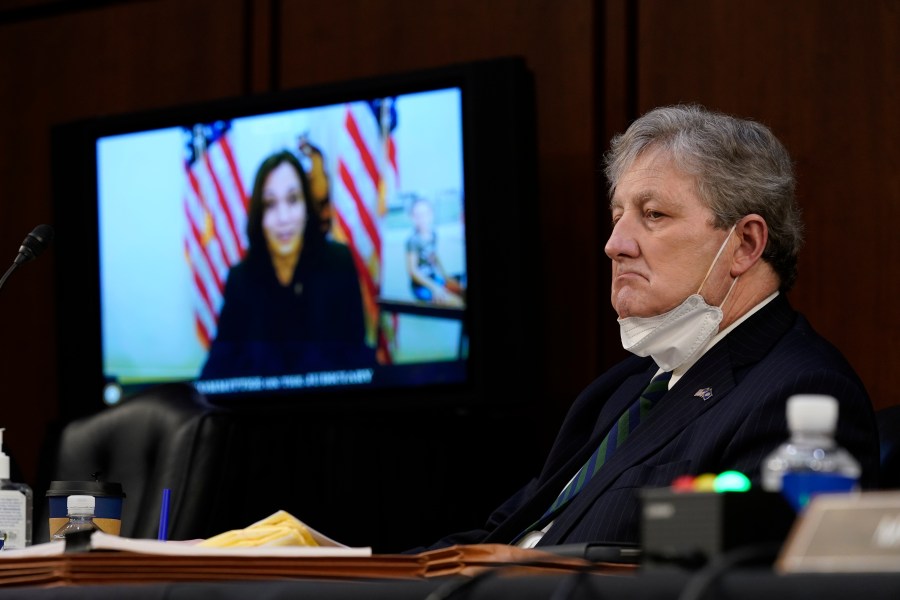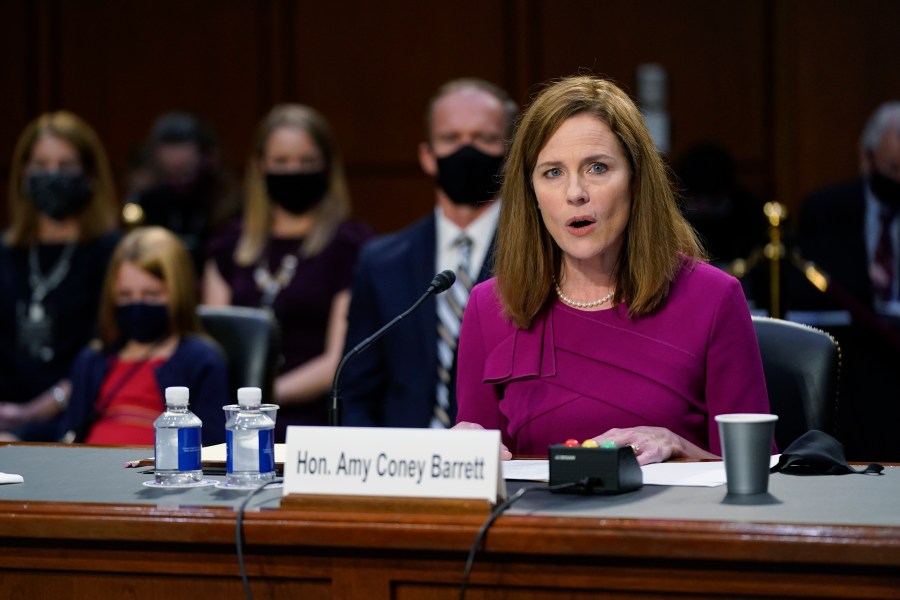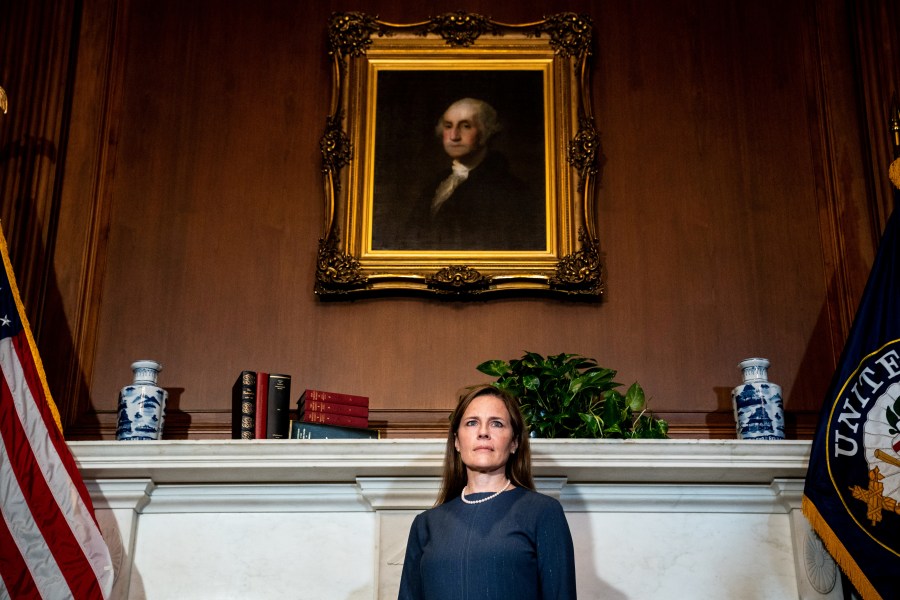Senate Judiciary Committee schedules vote to approve Amy Coney Barrett on Thursday
Testing on staging11
WASHINGTON (NewsNation Now) — President Donald Trump’s Supreme Court nominee Judge Amy Coney Barrett appeared before the Senate for the first day of confirmation hearings Monday.
The Senate Judiciary Committee hearings will span four days, beginning with members and Barrett herself making opening statements.
Opening statements
Senator Lindsey Graham, R-S.C., made the first opening statement before the Senate Judiciary Committee hearing Monday for Supreme Court nominee Judge Amy Coney Barrett. Graham, the chairman of the Senate Judiciary Committee, discussed the legacy of late Justice Ruth Bader Ginsburg.
“This is a vacancy that has occurred to a tragic loss of a great woman. And we’re going to fill that vacancy with another great woman. The bottom line here is that the senate is doing its duty. Constitutionally,” said Graham.
Graham went on to reiterate Barrett’s written statement sent to the Senate Judiciary Committee ahead of the hearing.
“She [Barrett] said I clerked for Justice Scalia more than 20 years ago. But the lessons I learned still resonate. His [Scalia] judicial philosophy. His mind. A judge must apply the law as written. Judges are not policymakers. They must be resolute in setting aside any policy views. They might hold. She will give her statement but I think that is a good summary of who she is. Amy Barrett is in terms of law.”
Sen. Dianne Feinstein, D-CA, ranking member of the Senate Judiciary Committee, echoed Sen. Graham’s sentiments about filling Justice Ruth Bader Ginsburg’s seat on the Supreme Court. Ginsburg’s nomination was the first hearing that Feinstein participated in, back in 1993.
“The nation lost one of our leading voices for equality. Ruth Bader Ginsburg left very big shoes to fill. Judge Ginsburg loved the law and she loved this country,” said Feinstein. “She worked all her life to ensure that the opening words of our constitution, ‘We the people of the United States in order to form a more perfect union’ included all the people, not just a few elite few. She was a standard bearer for justice.”
Feinstein reflected on the grave importance of replacing Ginsburg and how it will impact the future of the country.
“In filling Judge Ginsburg’s seat, the stakes are extraordinarily high for the American people, both in the short term and for decades to come. Most importantly, health care coverage for millions of Americans is at stake with this nomination,” said Feinstein.
She then compared the nomination with that of the vacancy left behind by the passing of Justice Antonin Scalia in February of 2016.

“Senate Republicans refused to consider a replacement for his [Scalia] seat until after the election. At the time, Senator McConnell said the American people should have a voice in the selection of their next Supreme Court Justice. When asked in October 2018 if Republicans intended to honor their own rule, if an opening were to come up in 2020, Chairman Graham promised, quote: ‘If an opening comes in the last year of President Trump’s term and the primary process has started, we’ll wait till after the next election.’ Republicans should honor this word for their promise and let the American people be heard,” said Feinstein. “Simply put. I believe we should not be moving forward on this nomination, not until the election has ended and the next president has taken office.”
Sen. Sheldon Whitehouse, D-RI, compared the nomination of Amy Coney Barrett to President Trump’s mishandling of the coronavirus pandemic.
“The whole thing, just like Trump, is an irresponsible botch. The irony is that this slapdash hearing targets the Affordable Care Act. This Supreme Court nominee has signaled in the judicial equivalent of all caps that she believes the Affordable Care Act must go and that the precedent protecting the ACA doesn’t matter,” said Whitehouse. “The big secretive influences behind this unseemly rush see this nominee as a judicial torpedo they are firing at the ACA. So I hope Republicans consider what’s at stake for the many people who depend right now in this pandemic on ACA health coverage.”
Senator Ted Cruz, R-TX, criticized the Democratic committee members, accusing them of using the nomination hearing for political gain ahead of the election, just 22 days away.
“Today every Democrat that has spoken, we’ve heard virtually not a single word about Judge Barrett. We’ve heard a lot of attacks at President Trump. We understand our Democratic colleagues are not supporters of the president. We’ve heard a lot of political rhetoric,” said Cruz. “But we’ve heard very little about the nominee who is here and whose confirmation we’re considering. And I think part of the reason for that is that on any measure Judge Barrett’s credentials are impeccable.”
Sen. Ben Sasse, R-NE, said he agrees with points made by his Democratic counterparts in regard to the “mismanagement of COVID by Washington D.C.” but says the committee needs to get back to basics and focus on the task at hand in choosing the next Supreme Court justice.
“Huge parts of what we’re doing in this hearing would be really confusing to 8th graders. Civics classes across the country tuned into this hearing and tried to figure out what we’re here to do,” said Sasse. “So I think it would be very useful for us to pause and remind ourselves and do some of our civic duty to 8th graders to help them realize what a President runs for, what a Senator runs for, on the other hand why Judge Barrett is sitting before us today and what the job is that you’re being evaluated for, so if we can back up and do a little bit of 8th grade civics. I think it would benefit us and benefit the watching country.”
Sen. Chris Coons, D-DE, said he and his Democratic colleagues will evaluate Judge Barrett’s record including her legal writings, opinions, articles and speeches as a law professor and as a circuit court judge.
“I think when we do that, we will conclude the ways in which you may serve as a justice will do irreparable harm. I think proceeding with this nomination in this way at this time will also do harm to what remaining trust we have in each other to the Senate as a whole and potentially to the court itself,” said Coons. “In light of the stresses on our country, I think this rushed hypocritical partisan process should not proceed but instead, we are.”
Sen. Joshua Hawley, R-MO, zeroed in on what he calls attacks on Barrett’s religious faith from the media and Democratic members of the committee.
“We’ve read stories about your Catholic lifestyle, stories about how you raise your children, stories about how you adopted your children, stories about your Catholic doctrinal beliefs. Over and over and over questioning whether you have, I guess, the independence to be a judge, a justice on the United States Supreme Court,” said Hawley. “Other senators on this committee last time asked you if you were an Orthodox Catholic. One senator says she worried that you would be a Catholic judge if you were confirmed because of your religious beliefs. I guess as opposed to an American judge, as if you can’t be both a devout Catholic and a loyal American citizen.”
Sen. Richard Blumenthal, D-CT, began his statement discussing the importance of keeping the Affordable Care Act, pointing out that his Republican colleagues have been trying to appeal it “dozens and dozens of times.”
“Just one week after the election, as you know, the fate of the Affordable Care Act will be again in the hands of the United States Supreme Court. Republicans have turned to the court to try to achieve judicially what they cannot achieve legislatively. President Trump has vowed that any judge he’d nominate would pass the very strong test, his words. And that they would strike down the Affordable Care Act,” said Blumenthal. “Judge Barrett, in all honesty, you have auditioned for this job through your academic writing and judicial opinions and you’ve passed that test. In fact, you stated twice in effect that you would have voted to strike down the Affordable Care Act had you been a justice at the time. You’ve been vetted, you have been screened by the Trump administration and special interests who want an activist judge. They want someone who will legislate from the bench and strike down laws supported by a vast majority of the American people. That activism uses originalism as a smokescreen.”
After the brief lunch break, Sen. Mazie Hirono, D-HI, resumed the hearing by breaking down the importance of the Affordable Care Act with personal stories from American families.
“The consequences of Judge Barrett’s confirmation would be devastating for millions of Americans who would lose their health care during this pandemic. Even in normal times without the threat of a pandemic, no one in our country should have to confront a major illness worried that it might bankrupt their families. But we all know these are not normal times. Health care is the number one concern for so many people in our country and they are rightly terrified that Judge Barrett will provide the deciding vote to overturn the ACA and take away their health care,” said Hirono.
Sen. Joni Ernst, R-IA, noted this is the first time that she has been a member of the Judiciary Committee during a Supreme Court nomination process but says she anticipates Barrett’s political opponents will continue to make “religious attacks” as they have on “nearly every Supreme Court candidate nominated by a Republican president.”
“I firmly believe in the role of our Supreme Court, it is the defender of our Constitution. At the end of the day, that’s my test for Supreme Court justice. Will you defend the Constitution?” said Ernst. “This week will be an opportunity to dig into your background further and understand more about your judicial philosophy. But what your political opponents want to paint you as is a TV or cartoon version of a religious radical. A so-called ‘handmaid’ that feeds into all of the ridiculous stereotypes they have set out to lambast people of faith in America. And that’s wrong.”
Sen. Kamala Harris, D-CA, vice-presidential running mate of Joe Biden, began her statement before the Judiciary Committee with criticism for more than 50 members of Congress gathering together for the hearings during the pandemic instead of working on pushing through a coronavirus stimulus bill.
“This committee has ignored common sense requests to keep people safe, including not requiring testing for all members, despite a coronavirus outbreak among senators of this very committee. By contrast, in response to this recent Senate outbreak, the leaders of Senate Republicans likely postponed business on the Senate floor this week to protect the health and safety of senators and staff. Mr. Chairman, for the same reasons, this hearing should have been postponed. The decision to hold this hearing now is reckless,” said Harris. “Not to mention that while tens of millions of Americans are struggling to pay their bills. The Senate should be prioritizing coronavirus relief and providing financial support to those families. The American people need to have help, to make rent or their mortgage payment.”
“Senate Republicans have made it crystal clear that rushing a Supreme Court nomination is more important than helping and supporting the American people who are suffering from a deadly pandemic and a devastating economic crisis,” Harris said. “Their priorities are not the American people’s priorities.”

Sen. John Kennedy, R-LA, started his testimony looking back at hearings for Justice Kavanaugh in 2018. Kavanaugh was nominated by President Trump and received criticism after allegations of sexual misconduct surfaced.
“I’m not naïve, I understand this thing can turn sour real fast. We all watched the hearings for Justice Kavanaugh and It was a freak show! It looked like the cantina bar scene out of Star Wars,” said Kennedy. “I know it must hurt for someone of deep Christian faith like yourself to be called a religious bigot. And to have it implied that because you’re a devout Christian that you’re somehow unfit for public service. I know you think it’s unfair, it is unfair for my colleagues to suggest some overtly, some more indirectly that if you’re put on the United States Supreme Court that you will be on a mission from God to deny health care coverage for pre-existing conditions for every American. I know that seems preposterous to you and it seems that way because it is.”

After four hours of testimony from members of the Senate Judiciary Committee, Supreme Court Justice nominee Judge Amy Coney Barrett was sworn into the hearing. Barrett began by reading her prepared written statement with an introduction of her family sitting behind her.
Barrett also credited her parents for being role models for her and her 6 siblings for “a life of service, principle, faith and love.”
Barrett talked about her education and credited her “wonderful legal mentors” who she clerked for, including the late Supreme Court Justice Antonin Scalia.
“Like many law students, I felt like I knew the Justice [Scalia] before I ever met him because I had read so many of his colorful accessible opinions. More than the style of his writing though, it was the content of Justice Scalia’s reasoning that shaped me. His judicial philosophy was straightforward. A judge must apply the law as it is written, not as she wishes it were. Sometimes that approach meant reaching results that he did not like. But as he put it in one of his best known opinions that is what it means to say that we have ‘a government of laws and not of men’,“ said Barrett.
Barret went on to say Scalia was not only a legal mentor to her but also an example for a way of life.
“He [Scalia] was devoted to his family. Resolute in his beliefs and fearless of criticism. And as I embarked on my own legal career. I resolved to maintain that same perspective,” said Barrett.
Barrett said in her job as a 7th Circuit Court judge she carefully considered each case and did her “utmost to reach the result required by the law. Whatever my own preferences might be.”
Judge Barrett wrapped up her remarks before the Judiciary committee by explaining her reason for accepting the Supreme Court nomination.
“I believe deeply in the rule of law and the place of the Supreme Court in our nation. I believe Americans of all backgrounds deserve an independent Supreme Court that interprets our Constitution and laws as they are written. And I believe I can serve my country by playing that role,” Barrett said.
The Senate confirmation hearings process marks a crucial step before a final full Senate vote by the end of October on Barrett’s nomination to fill the seat left vacant by the late Justice Ruth Bader Ginsburg. It also gives the public an opportunity to hear from the candidate, in her own words, typically on issues related to judicial philosophy as well as opinions on hot-button social issues like abortion.
Recent nominees have typically kept those views close to their chests. Senators often follow up the testimony with further questions posed to the nominee in writing.
The 48-year-old U.S. Court of Appeals for the Seventh Circuit judge is President Trump’s third nomination to the Supreme Court, after Neil Gorusch and Brett Kavanaugh.

Her confirmation would create a 6-3 conservative majority on the court that could lead to rulings rolling back abortion rights, as well as expanding religious and gun rights.
Barrett will face questions from senators on Tuesday and Wednesday in lengthy all-day sessions. The hearing is expected to conclude on Thursday, with outside witnesses testifying about her qualifications.

Hearing Witness Schedule
As of Oct. 9, 2020, this is the schedule. Testimony by those who know Judge Barrett and legal experts is expected to follow the questioning of Barrett.
MONDAY, OCT. 12
- Sen. Todd Young (R-Ind.)
- Sen. Michael Braun (R-Ind.)
- Patricia O’Hara, professor emerita of law, Notre Dame Law School
- Judge Amy Coney Barrett (opening statement)
- Opening statements from Judiciary Commitee members
TUESDAY, OCT. 13
- Judge Amy Coney Barrett (Questioning begins)
WEDNESDAY, OCT. 14
- Judge Amy Coney Barrett
THURSDAY, OCT. 15
- Judge Amy Coney Barrett
